Book Reviews by Genre: Science Fiction
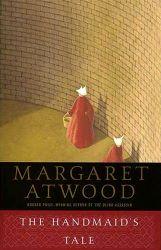
Warning: this book contains depictions of rape and violence. If either of these are sensitive topics for you, I would reccomend finding a different book.
"The Handmaid's Tale" is a story about a country that rises after the fall of America. In it, traditional gender roles are enforced by the government. Women are forced into the role of Wives, Marthas (women who clean the house), Aunts (women who are in charge of other women), and Handmaids (women who have sex with men to give them children). Offred has been taken from her husband and child, put into reducation, and forced to be a Handmaid for a commander. She makes her way through the new world while trying to keep fragments of her sanity, individuality, and happiness.
The descriptions in this book are incredible, almost poetic. The charcters in this book are all well defined, and feel like real people. Offred was a standout to me. Though she is the hero in the book, there's an inherent selfishness in her character. She has an affair with a married man. She decides not to help the resistance. She constantly mocks a woman who has been raped. Oftentimes stories will try to make a dystopia seem worse by making their protagonists innocent and pure. By making Offred so flawed, it draws attention to the fact that this treatment is unacceptable no matter who it's being done to.
The worldbuilding of Gilead is haunting. Margret Atwood has said that everything she put in "The Handmaid's Tale" has happened in history somewhere. That's probably part of why this book feels so real. Though it might seem unbelievable that a society could collapse and revert to such archaic values, looking into real life societal collapses makes it seem much more feasible.
I could talk about this book for far longer, but that would be unwise. In summary, "The Handmaid's Tale" is a wonderful, if not unsettling, read. I would reccomend it to fans of speculative fiction, anyone interested in learning about gender equality, and anyone who can handle a thought provoking read. As I said in the beginning though, this book can be upsetting at parts, so judge for yourself if you can handle that.
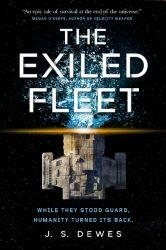
This is the sequel to Dewes' "The Last Watch". This book unfortunately no longer has the same antagonist. That conflict was resolved in the first book, so my favorite part of the last book is no longer a factor. This is not, however, the reason that I only gave this book a 4/5. I did not enjoy the content overload provided in "The Exiled Fleet". I enjoyed the increase in character development, but it lead to simply too much information. This also led to situations that only felt like they were there to develop one character before being cast aside. An example would be the airlock situation between Rake and Snyder. It felt really good to conclude the relationship between Cavalon and Snyder, but I wish there was more with Snyder before the entire book shoved more information and content about the next biggest thing. The content overload was my least favorite part of this book. My favorite part was, ironically, the character development. Rake dealing with trauma over Griffith, Cavalon's relationship with his grandfather, and the surge of sudden Jackin development. It's difficult to explain how my least and most favorite parts of "The Exiled Fleet" were the same, but it makes sense when the book is read.
Reviewer Grade: 11
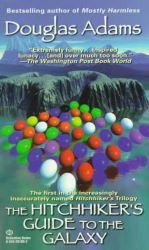
A Hitchhikers Guide to the Galaxy was a funny but interesting book. The book is about aliens destroying Earth to make way for an intergalactic bypass, and it follows a few characters trying to survive the universe that they've been put into. There were also many comedic moments, including strange things that the characters need in order to survive and be safe out in the galaxy, such as a towel, which is really important. The only thing I didn't really like about this book was that it was really difficult to understand at times. There were lots of confusing moments and new things just kept coming. But at the end of the book most of it started to make sense. Overall I thought this book was a great read if you like humor and are interested in space.
Reviewer Grade: 8
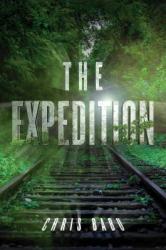
The second book in the Initiation series, we get to see more of the world. As the characters move farther out, they see that the leaders of New America have lied about the state of the world. As the protagonists go on through their journey, they start to uncover more and more secrets that New America has decided to bury. Though they are not left alone on their quest as New America has left them with four highly trained soldiers, supposedly to defend them from any danger. Tensions continue to grow between the Guardians and Draydens group, and both sides start to grapple for control, eventually splitting off. Both sides become contenders to finish the pursuit for supplies and tell their side first to New America.
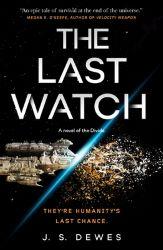
This is Dewes' fantastic debut novel about space, politics, and unknowable existence-ending eternal temporal torment. In fact, that last detail is my favorite part about the book. Not only is it an extremely interesting and unique concept for an antagonist, it is also a great antagonist. It is something that can be understood by the reader, but can't reasonably be understood by the reader. It in itself is a paradox that works as possibly my favorite antagonist this year. Again, it is simply the greatest unique idea I have read in a long time. I picked this book because I also loved Dewes' novel "Rubicon", so I looked for more books by the author. I honestly can't pinpoint a criticism that I have with this book. This book had just enough surprises where I was absolutely entertained, but I could still keep track of what was happening and which characters stood for what. I could relate to Adequin in her feeling of being inadequate (and actually being inadequate) for her assigned position. This book is a strong contender for being the greatest book that I have read this year.
Reviewer Grade: 11
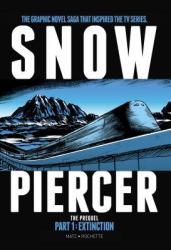
One of the best original sci-fi movies to come out in the last decade, in my opinion, was Snowpiercer (2013). The story originated as a 1982 French graphic novel under the name of Le Transperceneige. While I haven't read the original source material, I decided that a prequel graphic novel was probably pretty safe to read. I figured the events leading up to the world ending and a perpetual train being launched wouldn't spoil anything for me (I also haven't seen the TV show either).
While it's only a scant 90 pages, part 1 of this prequel trilogy, Extinction, had nothing I didn't already know in it. Most of the plotlines in this book were fairly generic end-of-the-world-type stories. Each one obviously would lead to the last of humanity boarding this infinitely running train, which was no surprise. It probably didn't help that there weren't that many distinct characters to latch onto in this book to make it more relatable. I understand that it's laying the groundwork for the next two books, but it almost felt that this part of the prequel series was unnecessary.
Perhaps I'm more inclined to cleaner art in graphic novels I like to read. This book had a rough, almost sketch-like style I found to be unpolished. Maybe that was the feeling the illustrator was going for, but some scenes were hard to parse visually because of how dark and thick the lines were. Granted, I still want to go back and read the original graphic novel to see if the style fits better for the actual post-apocalyptic story. However, for this "real world" setting, the art style feels too heavy even for a pre-apocalypse story.
A somewhat unnecessary story with a heavy visual style, I give Snowpiercer - The Prequel Part 1: Extinction 3.0 stars out of 5.
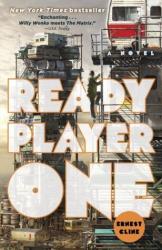
Ready Player One is an amazing Sci-Fi book with the protagonist being Wade Watts. The Year is 2045 and us humans have used almost all of our fossil fuel and are keeping worse care of our planet. Thankfully technology has further developed and there is a Virtual reality called the OASIS (Ontologically Anthropocentric Sensory Immersive Simulation) created by James Halliday. The OASIS is accessible to anyone in the world, aside from the wondrous video game aspect from it there is an entire school system embedded in the code. Although Halliday died in 2040 his legacy lived on. Halliday created a challenge for any OASIS users, before he died he proposed a contest. Halliday hid secrets within the code and if you could figure them out you could inherit his fortune (half of a trillion dollars) along with control of the OASIS itself. Even after 5 years though no one had come even close to solving his riddle,
“The Copper Key awaits explorers
In a tomb filled with horrors
But you have much to learn
If you hope to earn
A place among the high scorers” (Ernest Cline, Ready Player One)
But one day, Wade was attending school and it hit him like a monster truck he knew how to solve the riddle.
Ready Player One is a truly fascinating novel. I would recommend it to anyone 14+. If you have an interest in highly developed characters, a futuristic dystopian world, 1980’s pop culture, and video games this will be a book that’s hard to put down. Wade Watts is of course the most advanced character since he is the main protagonist. Ernest does a wonderful job at explaining Wade’s backstory and how it is affecting him in the present. And the way that the world is now so messed up in the book and how Ernest depicted how it would be is amazing. Wade lives in a place called the stacks, an old field that has multiple RVs stacked on top of each other. Also people who were born in the late 1960’s or early 1970’s will get a kick as they remember their teen years in the 1980’s and understand the references. And of course if you love video games you will hear yourself cheering on Wade as he has to defeat bosses and figure out the riddles. Overall, I think that Ready Player One should be a book that most teens and young adults should read because I genuinely think that you will love this book as much as I did.
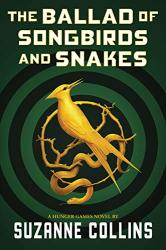
If you have read the Hunger Games series, then you know that President Snow is the main villain and set a iron grip on the Districts of Panem. I you haven't read the trilogy, then might I highly suggest you do.
This book takes place decades before the trilogy starts and we read through Coriolanus Snow's eyes before he becomes the president and monster of Panem. Coriolanus has already set himself up to be in a position of power even as a young adult, and after his city was besieged, and his parents died, the Snow name and fortune left in ruins. Coriolanus Snow has decided that he will never be the weaker side again. The Hunger Games were not a new event for Panem during the time yet they were never popular, now though Coriolanus and his class are each assigned a tribute to make the Games finally noticed. Coriolanus has been assigned the girl of District 12, perhaps the worst choice available, or so he thinks.
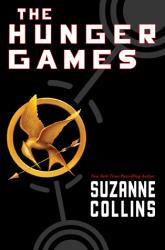
The "Hunger Games" by Suzanne Collins is a suspenseful novel about 16-year-old Katniss in the dystopian land of Panem. In this world, the 13 districts protested against the government. In punishment, they must provide two tributes (one boy and one girl) from each district. When Katniss's sister was chosen as tribute Katniss stepped up to protect her. Now she must fight to the death with the other 23 tributes for a chance to continue with her life.
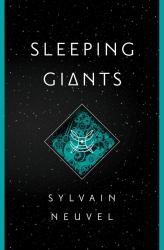
Sylvain Neuvel's "Sleeping Giants" is the first book in a series of three fantastic novels about alien technology and what it means to be human. This book was lent to me by my father, so I knew it had to be amazing. I was not wrong in that assumption. My favorite part about this book is likely the most divisive part: the format. This book is explained in an interview format, between each character and a mysterious interviewer that is developed further in the later installments of this series. At first, I wasn't sure if I would like how jarringly different this format is; sometimes it is noticeable when the author wanted to convey some important information, but the constant interview made the information difficult to show. It wasn't exclusively interviews; occasionally a mission log was used for variety's sake. My least favorite part of the book is actually what wasn't included in the book. It sounds picky, but I think that this book had room for more. The cliffhanger, while masterfully executed, came too soon. Not enough happened before the book ended, so I was left immediately scrambling to acquire the other 2 books in the series. The book, and especially the series as a whole, is absolutely surprising at nearly every step. Characters assumed narratively immortal die, and enemies turn into friends that save the world in the third book. Each character had interesting flaws and contrasting personalities, so each character introduced to us through the mysterious interviewer felt like someone you could meet walking down the street. All in all, this book is definitely one of the best books I have read this year.
Reviewer Grade: 10
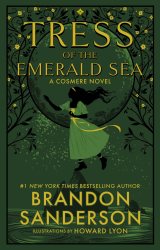
The book "Tress of the Emerald Sea" was a brilliant standalone book set in Brandon Sanderson's "cosmere" (his unique term referring to the general world where most of his books take place). I didn't actually choose to read this book; my uncle lent me this book because I love nearly all of Brandon Sanderson's books. After reading this magnificent book, I am very thankful for his generosity. I enjoyed the development of the protagonist, Tress, over the book the most. Tress stays kind throughout the entire book, but her bravery develops as she grows from a timid cup collector to something I don't want to spoil, but she gains a massive amount of bravery in the pursuit of kindness. I didn't enjoy the ease at which the final boss was dealt with, but the conclusion was relatively tidy and neat. This is the type of book where I constantly need to ask myself, "How did the author think of this"? Spore oceans that kill you but still float ships? Cup collectors creating chaos? Nothing was offensively predictable, and the little twist right at the end reminded my instantly of Studio Ghibli's Spirited Away's little twist at the end regarding the protagonist's parents. I won't say this has been the best book that I've read this year, but that is only because the year is still young and Brandon Sanderson's kickstarter had 3 other books in it.
Reviewer Grade: 10
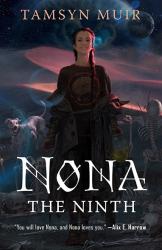
Nona the Ninth is the third book in the Locked Tomb series. It was an unprecedented addition, as the series was originally meant to be a trilogy that would end with Alecto the Ninth. And after reading this book, I couldn't imagine the series any other way. This book takes a step away from our principle protagonists and inter-planetary conflict to zoom in on Nona, a young woman who has technically only been alive for six months. She is a great teacher's aid, a fantastic dog watcher, and a caring friend. As her city crumbles around her and the secrets of her origin begin to come to light, Nona must keep trust in herself and the people she loves if she hopes to make it to her birthday.
I've seen a lot of reviews comparing this book to the first two in the series. In my opinion, there is no comparison to be made between any of them. The first is a thriller mystery in a nightmare castle with newfound friends. The second is a psychological horror story that occasionally becomes a soap opera. The third is slice of life, and the most heartbreaking of all three. I agree fully with the choice to make this a separate book, instead of trying to cram this into a climactic series ending. The series needed time to breathe from the revelations and consequences of the first two books, and to develop many of the wonderful side characters. On this note, the side characters in this book ruined me. They are constantly hilarious. They are perpetually heartbreaking. They have so much love for each other and it tears me apart. They are also fantastically developed, to the point where the thought of losing any of them almost stopped me from finishing the book. A large part of what made them special was seeing them through Nona's eyes, which was a fantastic combination of naively loving and strangely perceptive. Speaking of which, Nona's perspective was a special treat. Throughout the series, the author usually increases tension and intrigue by seriously limiting someone’s perspective. Previously this had been by outside parties hiding information or the unreliability of the narrator, but Nona being a mental six-month-old was a special treat. She attempts to relay everything with accuracy, but with limited experience and vocabulary the audience is forced to experience everything with fresh eyes to try to see it for what it is. Beyond all this, the story shined in all the usual departments for this series. The humor was exceptional, probably the funniest the series has been since the beginning of Gideon the Ninth. I particularly enjoyed the dream sequence narrations, as they were beautiful, insightful, and insanely funny. Sometimes I feel like Muir makes nearly every one of her characters funny so they can rip your heart out later with a little extra oomph. The worldbuilding continues to be a harrowing endeavor in the best way, as you have to take the time to figure it out for yourself with what little glimpses the book gives you. The only complaint I feel like someone could make about this book is that the pacing was pretty slow in the beginning to establish the ensemble cast, but I loved every minute of it so I can’t complain.
In conclusion, this book is another triumph for the Locked Tomb trilogy, and I can’t wait to see what comes next! I’d recommend this book to anyone who loves found family, slice of life stories, lots of explosions, zombie princes, and dogs with too many legs!
Reviewer Grade: 12
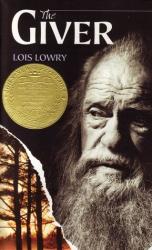
The Giver by Lois Lowry explores themes of individuality, memory, and conformity in a dystopian society. Set in a world where pain and suffering have been eliminated, the story follows Jonas, a young boy who is chosen to become the Receiver of Memory, a role that involves experiencing the past and holding the collective memories of his society. Jonas is a sympathetic and relatable protagonist, with his experiences and struggles serving as a lens through which the reader can explore the world of the novel. The plot of The Giver is very compelling- Lowry’s exploration of memory and its role in shaping identity is particularly well-done, with her depiction of the ways in which the absence of memory can lead to conformity and complacency providing a powerful critique of authoritarian societies. The climax of the novel is both suspenseful and poignant, with Jonas’ actions serving as a powerful statement about the importance of individuality and freedom. Additionally, Lowry’s writing style is both elegant and understated, perfectly capturing the voice of a young boy struggling to make sense of the world around him. To me, The Giver was a fantastic book because of how much it made me think and consider the world around me, and because of how intriguing the contrast between Jonas's dystopian society and the view into the past was. I would highly recommend this book to any and all dystopian lovers.
Reviewer Grade: 11.
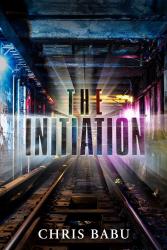
The moment you open the book your going to be immediately thrown into the story. A deadly plague has overtaken the world and the few thousand humans left reside in what used to be Manhattan; now called New America. From Drayden (the main characters) perspective we get to see that New America has a tight hierarchy. All citizens of New America get one chance to elevate above the area they were born, and the stories spread around this "chance" make most pass it up. Drayden though, he has decided to play New Americas deadly game.
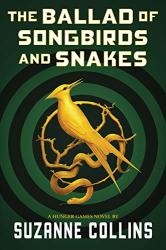
The Hunger Games: The Ballad of Songbirds and Snakes by Suzanne Collins is a masterful prequel to the wildly popular Hunger Games trilogy. Set 64 years before the events of the first book, The Ballad of Songbirds and Snakes explores the origins of the Hunger Games and the rise of the villainous President Snow. The main character, Coriolanus Snow, is a fascinating and nuanced character, with his motives and actions constantly shifting throughout the novel. His relationship with his fellow tribute, District 12's Lucy Gray Baird, is particularly compelling, with Collins exploring themes of loyalty, trust, and love in a way that is both nuanced and emotionally resonant. The plot of The Ballad of Songbirds and Snakes is both gripping and thought-provoking. Collins deftly weaves together political intrigue, personal drama, and action-packed set pieces to create a narrative that is both thrilling and emotionally engaging. The Hunger Games themselves are particularly well-done, with Collins using them as a vehicle to explore the darker side of human nature and the impact of power and privilege on individuals and society. Collins's descriptions of the Capitol and the districts are vivid and immersive, offering a richly detailed portrait of the world of Panem. Her use of foreshadowing and symbolism, such as the mockingjay, adds depth and meaning to the story, inviting readers to reflect on the deeper themes of the novel. This book was a stellar prequel to the Hunger Games trilogy that adds a lot of perspective and background to the original story. I would highly recommend this book to anyone who enjoyed the original novels and wishes to explore more of the Hunger Games world. Reviewer Grade: 11.

Fahrenheit 451 by Ray Bradbury delves into the dangers of a society where books are banned and critical thinking is discouraged. The novel follows protagonist Guy Montag, a fireman whose job is to burn books, as he begins to question the oppressive society he lives in and seeks to uncover the truth about the value of literature. The plot of Fahrenheit 451 is both compelling and thought-provoking- Bradbury’s dystopian world is entirely possible, and his exploration of the consequences of censorship and intellectual suppression can be easily applied to modern times. The story is driven by Montag’s journey of self-discovery, which is filled with twists and turns that keep the reader engaged until the very end. Bradbury’s writing style is poetic and evocative, bringing the world of Fahrenheit 451 to life with vivid descriptions and metaphorical language. His use of symbolism is particularly effective, as he weaves in recurring motifs such as fire, the mechanical hound, and the phoenix to add depth and complexity to the story. The novel is also structured in a way that mirrors Montag’s journey, with the pace and tone shifting as he becomes more aware of the world around him. Overall, Fahrenheit 451 is a very thought-provoking and symbolic classic that really makes you rethink the value of intellectual freedom and education. Every time I read it, I recognize more symbols, hidden meanings, and references that really enrich my experience. I enjoyed this book very much and would recommend it to anyone interested in dystopian, mind boggling novels.
Reviewer Grade: 11.
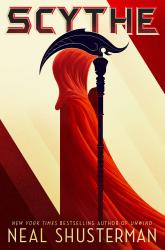
Scythe is the start of the Arc of a Scythe trilogy, set in the far future, humanity has overcome any and all problems. Except one, death, humans no longer keel over to illness, accidents, or war, but the Earth's population must be kept in check, thus humans must die. And so only the most humble and moral are put to the task. But of course humanity is fallible and the words humble and moral start to become rare words to describe the dealers of death. This book kept me constantly reading and wanting more (also had me checking my holds for the next in the trilogy), by far one of my best and most entertaining reads.
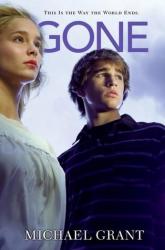
Gone, written by Michael Grant, is an action-packed dystopian novel that explores the struggle for survival in a world where all adults have vanished. The story takes place in a small California town, where everyone over the age of 15 has disappeared, leaving the children and teenagers to fend for themselves. The protagonist, Sam, is a relatable and sympathetic character who is thrust into a leadership role as he tries to keep the remaining kids safe and find out what has happened to their families. The world-building in Gone is impressive, with the small town and surrounding wilderness being vividly realized and full of danger. The supernatural elements of the story, such as the strange powers that some of the children possess, add an extra layer of intrigue and mystery to the plot that I very much enjoyed. Additionally, the novel explores a number of themes including moral and power struggles that the characters must face head on, and the shifting of the narration between several characters allows for some really good insight into how the characters' fight for survival has affected them each. Overall, Gone is a well-written and engaging novel that is sure to appeal to fans of dystopian and action-packed stories, and leaves off on a cliffhanger that encourages readers to read the remaining eight novels in the series. I personally enjoyed the plot and its many twists very much, and have read the rest of the series as a result. Reviewer Grade: 11.
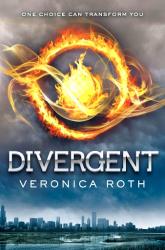
Divergent is a book that really drew me in as I was reading. The story starts from Beatrice Prior’s (also known as Tris) point of view. Within the world that she lives in, there are five factions. These factions being dauntless, candor, erudite, abnegation, and amity. Tris ends up choosing to go into the dauntless (the fearless) faction. Among being placed into the dauntless faction, Tris Prior meets Four. Four and Tris “hit it off” after seeing each other and the fall in love quickly. The two have different personalities which seems to click. The novel follows Beatrice and Four as they laugh, love, keep secrets, butt heads, and much much more.
I really like the variety in genres of this book. The book does have romance, humor, fantasy, but it also has action and mysterious elements to it. The short chapters make this book really good at keep the reader’s attention span. The scenes described in vivid detail allow you to feel like part of the story and envision it in your mind. This book is the first of three books. The three books were turned into movies and the first one being Divergent. If you’re looking for a read that is compelling enough to keep your attention span, have a little of every genre, and describes scenes in extreme detail, this book is for you!
Reviewer Grade: 8
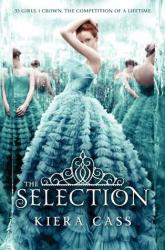
The Selection was a very fun book for me to read, because it was a quick read fantasy book. It incorporates all the elements a romance lover looks for in a book. It is a love triangle, enemies to lovers, and friends to lovers novel all in one. America is a very strong and independent character, but we see her become more open minded and willing to work with others instead of fighting them. It is cool to see her perspective on the life she wants change as she gets to know Maxon, but she never forgets the change she wants to make for the people of her past life. The book was not my all time favorite, because the plot can be a little more predictable at times, and some parts are slower. Although, it is definitely worth reading.
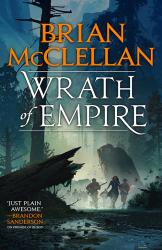
Wrath of Empire is a fiction book by the author Brian McClellan. It is the second book in the Gods of Blood and Powder trilogy. This trilogy is also a sequel trilogy to the amazing trilogy The Powder Mage. I chose this book in particular because of how much I loved both the first trilogy and because the previous book Sins of Empire left an amazing cliffhanger in preventing the rise of another god. I chose to read the first book of the first trilogy because the author, Brian McClellan, was strongly recommended for fans of Branden Sanderson's work (another fantastic author). The book largely follows 3 main characters: Lady Flint, a minor character from the previous trilogy who leads a mercenary group known as the Riflejacks, Michel Bravis, a spy that double-crosses the group he double-crosses for, and Mad Ben Styke, a cavalry leader focused on escorting and protecting a magical savant (the savant, Ka-Sadiel is trying to prevent the creation of another god). Each character was exceptional in their own way; personally, I enjoyed Michel's sections the most because of the consistent location (both Lady Flint and Colonel Styke are travelling to prevent a creation of another god, but Michel stays in the same location for the majority of the book). This book was full of surprises as amazing characters died and lied while striving to bide their time. None of the characters are wholly relatable because I am a child that could not survive a war. At moments, however, nerves would build and sympathy would be drawn from the reader (e.g. when Michel didn't know if he could ever find an important character in a massive city). This is definitely one of the best books I have read this year.
Reviewer Grade: 10
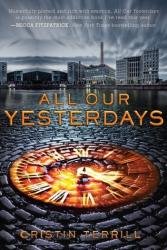
Wow. I could not put this book down. It was so action packed, I really enjoyed the character development, the twists. One of those books that leaves your mind spinning and you’re so wrapped up in the world you’re not sure how to move on to another book. I’m surprised all this was able to be done so well in a singular novel. But the pacing felt great and there wasn’t anything I was left wanting from the book. Were there any character flaws or plot holes? I mean sure but nothing that was so noticeable to me that it deterred my enjoyment while reading. Definitely one of my favorite YA novels.
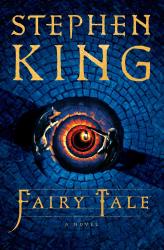
The Lord of The Rings, Harry Potter, Hobbit and The Chronicles of Narnia have already won the hearts of millions of readers of all ages. Fantasy novels with complex plots, written in the understandable even for the youngest readers language, keep older generations excited and thrilled as well. The Fairy Tale by Stephen King can definitely be included in this honorable list. Describing the incredible adventures of Charlie Reade, it takes us to the mystical world and introduces to the ancient evil monsters and brave fighters for freedom.
Everything starts simple enough. The characters are living their ordinary enough lives and dealing with their down-to-earth duties and routines. But everything changes when a 17-year-old Charlie Reade decides to help his old grumpy neighbor. He discovers the door to the hidden world, where life is paralyzed by a curse that erases people’s faces and takes their sensations away from them. An evil tyrant Flight Killer and is the one who stands behind it. And, as it normally happens in fairy tales, Charlie turns out to be the one, whose mission is to defeat the evil, liberate the city of Lilimar and save the fallen princess. Is it truly up to a high-schooler to beat the powerful monster? And what does it have to do with an old ill German shepherd? The Fairy Tale has the answers for all these questions.
The audience gets a chance to dive into the exciting and cozy atmosphere of the good old stories, heard in childhood, and, at the same time, enjoy the complicity of created by King universe and charm of human feelings and behaviors. Classical fairy tale plot and motives make the novel easy and pleasant to read, however, as any fairy tale, it contains hidden moral and promotes eternal values.
Reviewer Grade: 12
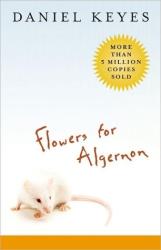
Flowers for Algernon is stunning commentary on the way society perceives intelligence and its connection to personal value. The creative liberties taken with this book to modify diction to match Charlie Gordon's knowledge create a more personal connection with the beloved narrator. I found myself celebrating the first time he used a comma or a metaphor. Although this book was difficult to read at first, I understand that those creative choices enhance the impact of the story later on in the book. The reason I wouldn't call Flowers for Algernon perfect is I feel some of the development in the middle diverted from his climactic conversations with the doctor and professor. The story seems to split into two at once: one of Charlie's emotional intelligence struggling to keep up with his knowledge, and one of his environment's reactions to his sudden genius. Though I enjoy both perspectives, I feel the conjunction creates clutter in what could be one flawlessly streamlined story. However, both stories are executed beautifully, and the journey of Charlie Gordon is both profound and emotionally charged. Flowers for Algernon is certainly a novel I'll mull over in years to come.
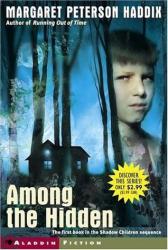
In a future where the Population Police enforce the law limiting a family to only two children, Luke has lived all his twelve years in isolation and fear on his family’s farm, until another “third” convinces him that the government is wrong.
The book is a dystopian world set in present day where teenagers are able to come together in crisis to try and change the government and let their voice be heard. I chose to read this book back in third grade and still remember to this day how good it was. The elements of the book were enticing and had me looking forward to what was next. It gave great arguments of why the government is wrong and how the rich, called “barons,” get to do what they want. As a kid I didn’t have any negative thoughts, and if I were to pick it back up, I would still have good thoughts about it. This book is part of the Shadow Children collection, with seven books in it and each of the books get better. People who enjoy adventure, plot twists, and exploring different perspectives would like Among the Hidden.
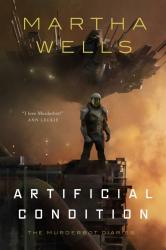
After being disappointed with the length of the first entry in the Murderbot Diaries series, I'm glad that I stuck with it and read the second book, Artificial Condition. While All Systems Red was necessary to introduce the concept of a sentient (and pacifist) murderbot, this book was much more interesting from a narrative perspective. At this point, I'm used to the short length of these stories, but after reading this book now I have to know how the rest of the series plays out.
The titular murderbot in this book felt much more fleshed out (ha ha) as a character. Having moved past the phase where it recognizes that its sentience is an anomaly, the challenge of fitting into society as a murderbot or as a human as the circumstances warranted was much more enthralling. The interactions with other AI like ART were much more entertaining than merely hearing about how the murderbot liked to binge TV shows. Perhaps the fact that much of the exposition covered in the first book is now out of the way, I felt this book didn't feel as much like an info dump.
Now that the murderbot is on its own, the goal of learning about its past is something that is not only interesting to read but provides a lot of opportunities for great action sequences. The author expertly puts the main character in situations where it has to use its AI advantages to make life-saving decisions despite the core code of its being originally designed to kill humans. The amount of character growth from the first book to the end of this one is definitely what will bring me back to finish out this series.
An improvement from the first book in the Murderbot novella series, I give Artificial Condition 4.5 stars out of 5.
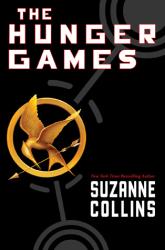
I loved this series! As a big sister, I was hooked the moment Katniss said "I volunteer!" It is a great read about hardship and rebellion. How one person can make a big difference even without intent. I have read it with my oldest and will read it with my youngest at some point. But this is the book that got me reading again and I love to read it over and over.
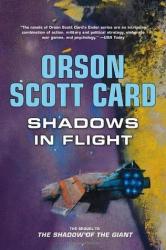
You know how sometimes a series has overstayed its welcome? How, even though the author has wrapped up most of the loose ends, there's another story afterward that only exists to extend the series even farther than it has already come? The only times I can forgive these extensions is if the story in question isn't particularly long. For instance, the "epilogue" story in Marissa Meyer's Stars Above is a great way to show the characters settling into normal life after the main conflict ends. Shadows in Flight is almost unnecessary, but at least it's short.
Shadow of the Giant was a satisfying conclusion to the Ender's Shadow saga, so the fact that Shadows in Flight exists is merely to wrap up Bean's story even if the rest of the world had already reached its peaceful conclusion. After all, one question remained from this series: can those with Anton's Key be cured of their premature death and still keep their incredible gifts? This story sets out to answer that question and give Bean the (second) send-off he deserved. Fortunately, it's a relatively short book, since there isn't much else to say on the matter.
The problem is, there's nothing particularly new in this book when compared to the other eight books in both the Speaker for the Dead and Ender's Shadow series. This is perhaps because the three new characters (Bean's children) were repeated archetypes from their respective namesakes. It's always nice to have a little more content in the Ender universe, but even I think this feels like a post-it note scribbled on the back of the end of the series.
Wrapping up the final loose ends of the Ender's Shadow saga, I give Shadows in Flight 3.0 stars out of 5.
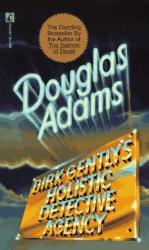
Dirk Gently’s Holistic Detective Agency is a story about love, loss, stuck couches, time travel, bad magic tricks, and the beginning of everything. It's an examination of death, life, conscious, and missing cats. But mostly, it's about a detective agency that does no detective work, and the people that get roped into it.
It would be very hard for me to describe the plot of Dirk Gently's Detective Agency. It's a book that's highly based on time travel, and this is fully taken advantage of in the novel. Things happen out of order, and it doesn't follow the protagonists journey through time. Rather, the reader and the characters are forced to piece everything together one strange moment at a time. I had to read this book, reread the ending again, then cave and read Wikipedia before every piece fell into place. This is a book that needs to be read more than once. The question is if it's worth it. I feel that it is!
This book exhibits some of the best of Douglas Adams: nonsensical stories, quirky characters, silly syntax, and an emphasis on the absurd. I especially love how are the characters are connected, by circumstance or otherwise. I like the protagonist is confused all the time, because that made him very relatable over the course of the story. The story managed to be both extremely funny and heart wrenching and heartwarming in a relatively short amount of time, without too much whiplash. Every character makes you laugh while they pull at your heartstrings. Basically, everything weaves together like a quilt, whether the writing or plot or characters, to make something fun and fascinating and endlessly comfy!
All in all, this is an extremely interesting and funny book. I docked it some points because the confusing plot can detract from the story, but that's the only flaw I could find! I would recommend this to anyone who likes time travel, hilarious writing, and a real rollercoaster of a story!
Reviewer Grade: 12
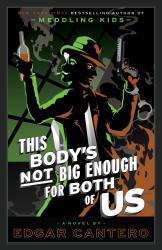
This Body's Not Big Enough for Both of Us is a wonderfully witty Jekyll-and-Hyde-esque tale of crime, passion, and sibling squabbles. Adrian and Zooey Kimrean are twins forced to share the same body: the same brain, the same limbs, the same life. After establishing a Private Eye business to utilize Adrian's deductive analysis and Zooey's creative skills, the two are thrown into the path of a mob war. Can they learn to work together, or will their self-destructive self-sabotage spell the end for the both of them?
This book is insane. It's absolutely insane. It's a rollercoaster of emotions, plot points, and story trajectory, and I loved every minute of it. The mastery of the book comes in large part from Cantero himself, and his mastery of humor and pacing and personality. Every character, especially the two main leads, seem to explode from the page. The book acknowledges the tropes of the detective story, and a lot of it plays into it, but there are also some wonderful subversions in the simple act of giving two-dimensional characters a lot more depth than they usually warrant. Very few characters are taken for granted. Beyond that, there's a beautiful vibrancy to the dialogue, and it highlights the unique character dynamics that emerge from the story. The story takes full advantage of its goofy premise, using it for all the drama and humor and plot fodder that it can. Both the hilarity and the absolute tragedy that is the main character's situation is wonderfully balanced. The jokes about it have some of the best slapstick and back-and-forth I've seen in a book. The sorrow of it was genuinely moving, and wasn't undercut or dragged out. Finally, even the writing was wonderful. The imagery was gorgeous, the prose was moving, and the general comic air of the book make the serious parts hit that much harder.
There are some problems with the book. Yes, the wildness of the plot can detract from the mystery. Sure, the humor can be crude and the ending was pretty conflicting. But I don't care. I read this book in a straight 48-hours and I wish it could've lasted for hundreds of hours more. It's a masterclass in characterization, dialogue, humor, and out-of-the-box writing. All in all, I'd recommend this for anyone who wants detective stories, mob wars, unlikely friendships, fantastic action, and one of the most interesting sibling dynamics you'll ever see!
Reviewer Grade: 12